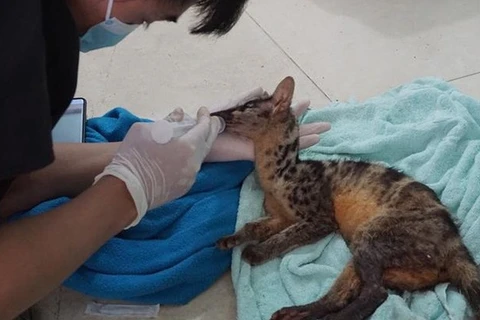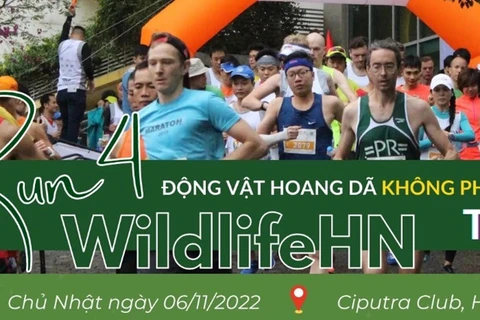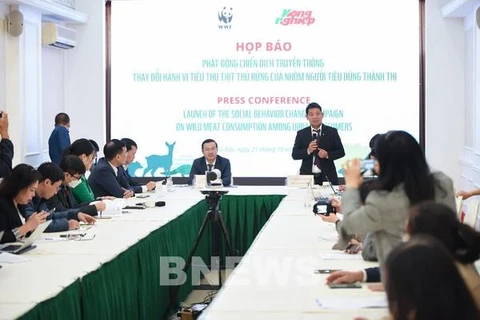Hanoi (VNA) – The Education for Nature Vietnam (ENV) has released a film highlighting health risks from dining out at restaurants that sell wildlife meat, and calling on the community not to support such restaurants, thus reducing the risk of extinction among rare animals and protecting the ecosystem.
The film tells a story about a family that are enjoying their favourite pork dish without knowing that their chef has just slaughtered a civet, and the continuous preparation of dishes that include wildlife without ensuring hygienic procedures may cause pathogens from the civet to spread to the dish that they ordered.
In Vietnam, many wild animals have been illegally consumed at restaurants, which has not only negatively impacted the natural population of wildlife species, but also increased the risk of transmitting wildlife-origin pathogens to customers. In fact, about 70% of the dangerous infectious diseases over the past 30 years have originated from animals, mainly wild animals.
In its conclusion, the film advised the community to stay away from restaurants or other establishments that keep or consume wild animals.
ENV Deputy Director Nguyen Thi Phuong Dung said that each year, thousands of wild animals are poached and then smuggled and legalised through licensed farms before being brought into restaurants and other business facilities. Wildlife trafficking is not only a threat to biodiversity but also harms human life, she said, stressing the need to stop the situation to protect public health.
Alongside, the film also calls on the community to say "no" to other activities that may increase the risk of spreading diseases of wildlife origin to humans such as captive breeding or illegal using wild animal products.
Earlier, an ENV film about the operation of wildlife trafficking hotline at 1800-1522 was screened in 54 TV channels of Vietnam./.
The film tells a story about a family that are enjoying their favourite pork dish without knowing that their chef has just slaughtered a civet, and the continuous preparation of dishes that include wildlife without ensuring hygienic procedures may cause pathogens from the civet to spread to the dish that they ordered.
In Vietnam, many wild animals have been illegally consumed at restaurants, which has not only negatively impacted the natural population of wildlife species, but also increased the risk of transmitting wildlife-origin pathogens to customers. In fact, about 70% of the dangerous infectious diseases over the past 30 years have originated from animals, mainly wild animals.
In its conclusion, the film advised the community to stay away from restaurants or other establishments that keep or consume wild animals.
ENV Deputy Director Nguyen Thi Phuong Dung said that each year, thousands of wild animals are poached and then smuggled and legalised through licensed farms before being brought into restaurants and other business facilities. Wildlife trafficking is not only a threat to biodiversity but also harms human life, she said, stressing the need to stop the situation to protect public health.
Alongside, the film also calls on the community to say "no" to other activities that may increase the risk of spreading diseases of wildlife origin to humans such as captive breeding or illegal using wild animal products.
Earlier, an ENV film about the operation of wildlife trafficking hotline at 1800-1522 was screened in 54 TV channels of Vietnam./.
VNA
























